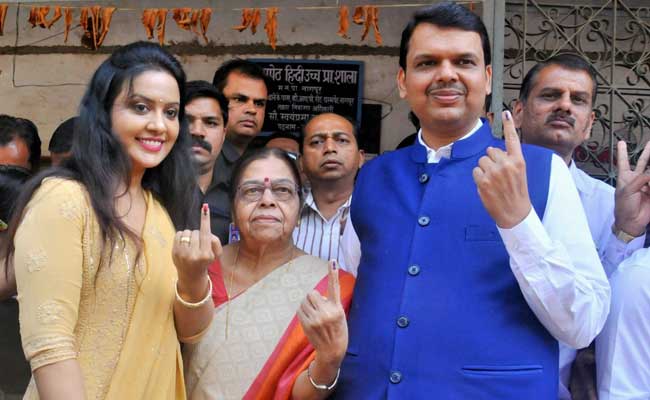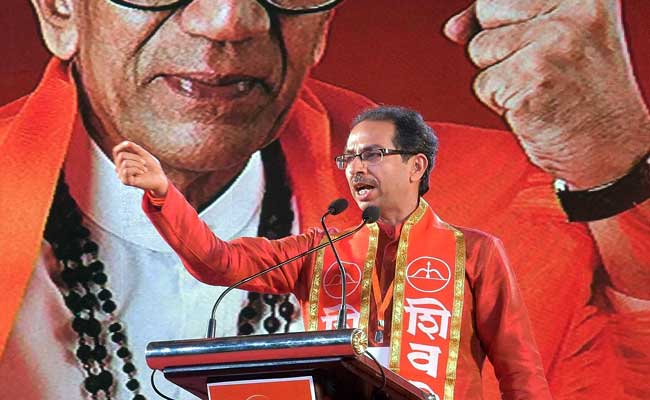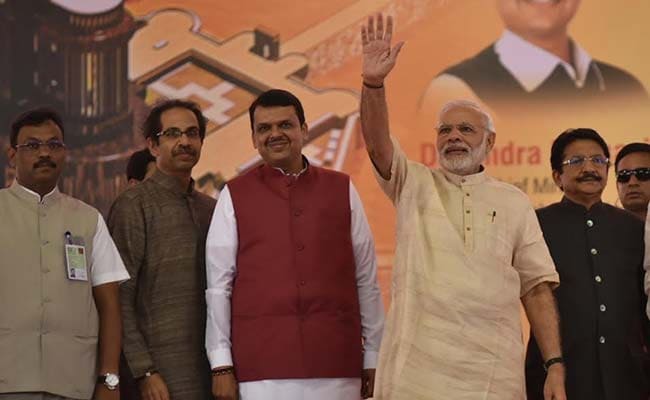One may argue that doing away with regional allies proves disastrous for national parties in the long run, but in this case, the BJP was on safe ground: an extremely popular and dedicated Chief Minister and an opposition (Congress-NCP) that was all but non-existent. The BJP's only opposition was the Shiv Sena, which as I had written in my previous column, has been steadily losing its popularity in Maharashtra. As I write this, the results from Mumbai suggest that BJP is neck-and-neck with the Shiv Sena. As of now, BJP stands at 82, well more than double its previous tally, while the Shiv Sena stands at 84, just two seats more than the BJP.

Chief Minister Devendra Fadnavis took on an angry Shiv Sena, which broke ties with the BJP just ahead of the civic elections
Nagpur boy Devendra Fadnavis and his one-time political rival and union Minister Nitin Gadkari have managed to retain Maharashtra for the BJP. In 2014, when the BJP gained power in Maharashtra along with the Sena, it was Nitin Gadkari who tried to stall Fadnavis' ascent to power as the Chief Minister of Maharashtra. As roads and highways minister, Gadkari went to town talking about road safety and new roads in the state, while Fadnavis was lauded for implementing the centre's schemes including safety for women, healthcare and cracking down on corruption.
But this is not 2014, and we are talking of the man of the day who till this morning was being labelled by senior journalists as the BJP's first casualty of demonetisation. Instead, Devendra Fadnavis, along with local leaders in Mumbai, has put the BJP in a position to have a big say in the choice of the city's mayor. In fact, the party could have its own mayor if it chooses to ally with another party to run the BMC. It could choose to remain a supporter of the Shiv Sena, which has led the 37,000-crore BMC for 20 years, but this time, the terms and conditions of the alliance will yet again be decided by the BJP - just as they were in 2014 when they partnered to form the state government.

The Shiv Sena is set to be the single largest party
And then Hardik Patel. It must be remembered that the Marathi asmita and the anti-outsiders crusade in the state was first espoused by Bal Thackeray and later taken forward by cousins Uddhav and Raj Thackeray. In fact in the last assembly election, the Shiv Sena had specifically targeted the Gujarati community for being disloyal to the state and rank outsiders. In its editorial in Saamna in May 2014, the Shiv Sena said, 'Staying in Mumbai, they (Gujaratis) enjoyed wealth. They minted money...those who were penniless exploited Mumbai, Maharashtra and built their own Dwarka of gold and are calling the shots in the country's power politics based on this wealth generated from Mumbai. They are chalking out plans on who is to be made the Prime Minister and who is to be deposed).
It was almost hara-kiri then, a sign of desperation, when the party chose not just a Gujarati to campaign, but a Gujarati disliked by the substantial Modi vote bank in Mumbai. The result was the non-Maharashtrian voting en masse for the BJP in the state.

Mr Fadnavis credited Prime Minister Narendra Modi's leadership for the party's performance (File photo)
No doubt Uddhav Thackeray has put up a great show in Mumbai in not being wiped out by anti-incumbency, but the point to be noted is that he has been unable to check the popularity of the BJP in the state despite running the richest civic body in Asia.
Another aspect that went in the favour of the BJP was Narendra Modi's very public affection for Sharad Rao Pawar in his speeches, which helped consolidated the NCP voter base in cities like Mumbai and Pune. The signal was loud and clear that the BJP is not averse to taking the NCP's help and no longer considers it a pariah. While this affection wiped out the NCP's base that saw it as a "secular" party, it consolidated the disgruntled voter in the BJP's favor.
Last but not least, the image of Fadnavis and his political acumen has made him the man of the match. If his strategy and image remain unaffected in the coming years, it won't be surprising if the BJP continues to hold lead in Maharashtra in the 2019 state election and manages to win the state without help from Shiv Sena. That could mean that Fadnavis gets a second term in Maharashtra from a grateful party.
(Rana Ayyub is an award-winning investigative journalist and political writer. She is the author of 'Gujarat Files', a book on the politics of Narendra Modi and Amit Shah in Gujarat.)
Disclaimer: The opinions expressed within this article are the personal opinions of the author. The facts and opinions appearing in the article do not reflect the views of NDTV and NDTV does not assume any responsibility or liability for the same.


